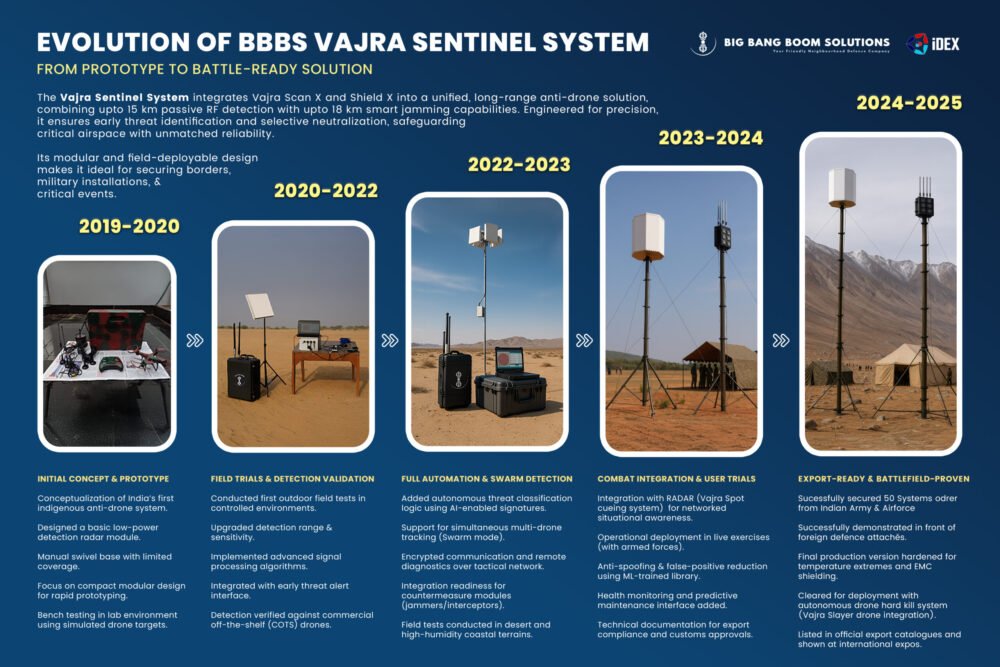India is at a pivotal moment in its journey as a global innovator. Once seen primarily as a service provider and IT outsourcing hub, the country is now rapidly emerging as a cradle of deep technology, R&D, and scalable innovation across strategic sectors, notably defence and aerospace.
This transformation has not occurred overnight. It is the result of deliberate policy interventions, sustained public-private partnerships, and a growing confidence among Indian entrepreneurs to solve not just consumer-facing problems, but also complex, high-impact national challenges. As the founder of a company operating at the intersection of defence innovation and advanced technology, I have witnessed this shift first-hand.
Policy Foundations for Innovation
The government’s flagship initiatives, such as Startup India, Make in India, and the Aatmanirbhar Bharat Abhiyan, catalysed this transformation. The Ministry of Defence’s iDEX (Innovations for Defence Excellence) platform has probably been the biggest game-changer. It has been a critical enabler, allowing startups to work directly with the Armed Forces to solve mission-critical problems.
The creation of this ecosystem has not only democratised innovation in defence but also broken the monopoly of legacy players. Through iDEX, young companies have proved that speed, creativity, and mission alignment can lead to world-class solutions.
Big Bang Boom Solutions is proud to be among the first cohort of startups to win multiple iDEX challenges. This recognition validated our approach to developing indigenous, full-stack defence technologies, from anti-drone systems and chemical engineering marvels such as the high-expansion firefighting foam. But most importantly, it gave us access to the Defence Ecosystem, the right mentorship, and the right problem statement. It also gave us the momentum to scale quickly while staying deeply focused on R&D.
Startup India, Make in India, and the Aatmanirbhar Bharat initiatives catalysed transformation. iDEX (Innovations for Defence Excellence) has been a prominent game-changer, a critical enabler, allowing startups to work directly with the Armed Forces to solve mission-critical problems
The Rise of Deep-Tech Startups
Indian startups are no longer content to build the next e-commerce platform or payment app. We are witnessing a surge of ventures tackling hardware, aerospace, quantum technology, AI, and autonomous systems. The maturity of the talent pool, especially in Tier 1 and Tier 2 cities, means that India can now build from scratch.
Deep-tech innovation, particularly in defence, requires a convergence of domain expertise, interdisciplinary engineering, and long-term investment. What sets India apart is the unique blend of frugal engineering, mission orientation and policy tailwinds that allow such ventures to thrive.

At Big Bang Boom Solutions, for example, we are not just building anti-drone systems; we are developing an inclusive framework that has offensive and defensive weapon systems, training tools, and AI as a Decision Support Tool. One of its prime examples is the recently introduced containerised firing ranges, which serve as mobile, scalable, and safe live-fire training environments, particularly valuable for border and remote deployment. It allows all-weather, on-demand training using advanced sensors and AI to ensure our soldiers get the best real-world experience in technology.
Our exports to friendly nations are proof that ‘designed-in-India’ no longer means compromise, but a competitive product.
Dual Opportunity: Innovation for Domestic and Global Relevance
India’s defence innovation landscape is driven by two complementary imperatives: securing our borders and contributing meaningfully to global security architectures. Startups are increasingly seen as co-developers by the Armed Forces, bypassing older procurement barriers.
On the domestic front, the geopolitical climate necessitates a rapid modernisation of the Armed Forces. Innovation is not optional; it is mission-critical. From smart fencing and battlefield decision systems to UAVs and cybersecurity, startups fill gaps with unprecedented agility.
India’s emergence as a technology powerhouse is not just about capital or policy; it is about mindset. For decades, Indian innovators were conditioned to think incrementally. That ceiling has now been shattered. Engineers are opting for labs over corporate jobs; deep-tech is considered high-prestige value
On the international front, India is uniquely positioned to become the ‘arsenal of the democratic world’. Countries in Africa, Southeast Asia, and Eastern Europe are looking for reliable, cost-effective, and ethically aligned defence partners. Indian technology, when proven in operational conditions, becomes immensely attractive.
Our journey at Big Bang Boom has followed this trajectory. What began as an effort to resolve Indian problems has now found resonance in Kenya, Thailand, Nepal, and other nations looking for robust and affordable anti-drone solutions.
Building a National Innovation Mindset
India’s emergence as a technology powerhouse is not just about capital or policy; it is about mindset. For decades, Indian innovators were conditioned to think incrementally. That ceiling has now been shattered. Engineers are opting for labs over corporate jobs; founders are prioritising IP over valuation, and deep-tech is considered high-prestige value.
Today, we see students building micro-satellites, startups designing space launch vehicles, and defence tech entrepreneurs taking on problems such as autonomous combat vehicles, real-time battlefield intelligence, and human-machine teaming.
The cultural shift is visible. Engineering graduates are choosing labs over investment banking. Founders are prioritising IP over valuation. There is pride in building something difficult, something that matters. This is perhaps the most exciting development of all: the normalisation of ambition in Indian innovation.
Challenges That Remain
While the momentum is strong, the journey is far from complete. Several structural challenges must be addressed:
Procurement Modernisation: The current procurement cycles in defence are still lengthy and complex. Greater transparency, faster trials, and modular contracting models will accelerate adoption.
Patient Capital: Unlike SaaS or consumer tech, deep tech ventures require patient capital. Dedicated funds for strategic technologies can bridge this gap.
Talent Retention: Indian R&D institutions produce world-class talent, but retaining them in domestic startups requires better alignment of compensation, mission, and opportunity.
Regulatory Hurdles: India has proved that startups can come up with ideas, win grants, raise funding, develop prototypes and systems, and complete trials. But challenges such as year-long processes to acquire defence licenses, complex regulations around factory lease restrictions, still place artificial moats around existing large defence companies. A proactive resolution to this would go a long way in turbocharging the ecosystem.
Big Bang Boom Solutions is not just building anti-drone systems; it is developing an inclusive framework that has offensive and defensive weapon systems, training tools, and AI as a Decision Support Tool. It is committed to building disruptive, indigenous, and scalable technologies for India’s Armed Forces and allies
The Road Ahead
India’s tryst with innovation is no longer aspirational; it is operational. We have moved from ‘why innovate’ to ‘how fast we can deliver’. For founders, building in critical sectors like defence is both an opportunity and a responsibility.
At Big Bang Boom Solutions, our commitment remains firm: to build disruptive, indigenous, and scalable technologies that serve both our Armed Forces and our strategic allies. We believe India can be the global benchmark for innovation with purpose. We innovate not just for profit, but for sovereignty, not just for market share, but for national security. And not just for recognition, but for resilience.
This is India’s moment. Let us seize it with bold ideas, deep conviction, and relentless execution.
The writer is Co-Founder of Big Bang Boom Solutions






